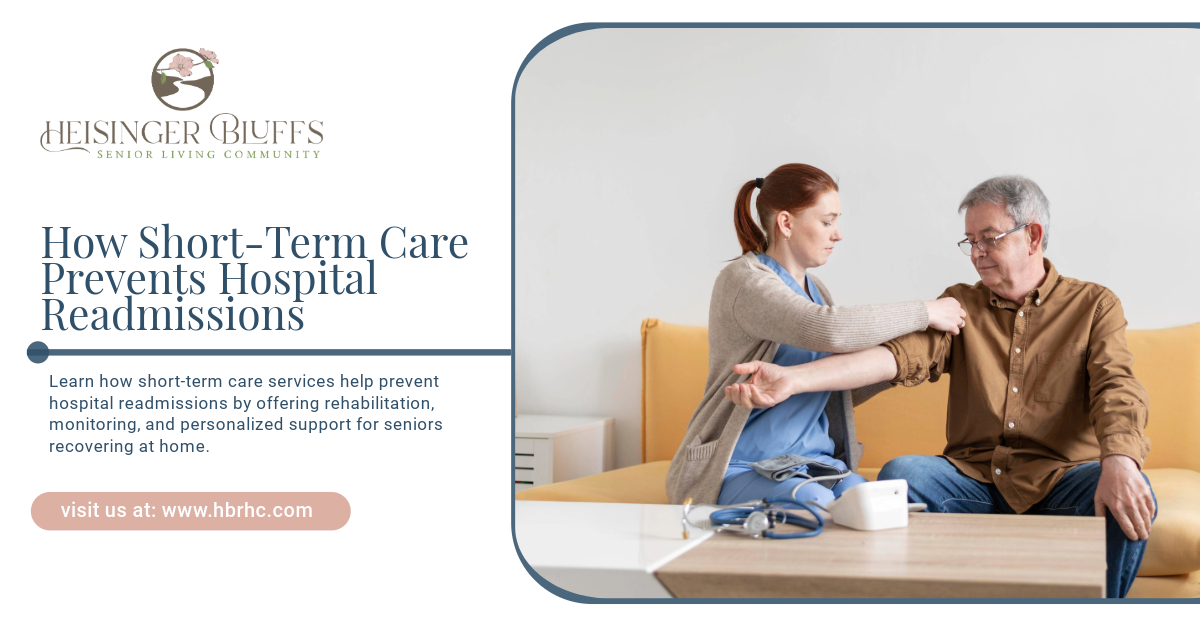How Short-Term Care Prevents Hospital Readmissions

Hospital readmissions can be stressful and costly for seniors and their families, not to mention potentially harmful to the health of the patient. For older adults recovering from surgery, illness, or an injury, short-term care can play a vital role in bridging the gap between hospitalization and a full recovery. By providing tailored medical care, therapy, and monitoring in a supportive environment, short-term care programs reduce the likelihood of returning to the hospital.
In this blog, we’ll explore what short-term care entails, the common causes of hospital readmissions, and how these programs address the unique needs of seniors to promote recovery and long-term health.
What is Short-Term Care?
Short-term care is a temporary care service designed to help individuals recover from medical events, such as surgeries, strokes, or falls. It typically lasts for a few weeks to a few months, depending on the patient’s needs.
Services Offered in Short-Term Care
- Physical Therapy: Helps regain strength, balance, and mobility.
- Occupational Therapy: Teaches patients how to safely manage daily activities like dressing, bathing, or cooking.
- Skilled Nursing Care: Provides wound care, medication management, and chronic disease monitoring.
- Emotional Support: Offers counseling and mental health support to ease the transition to recovery.
The Risks of Hospital Readmissions
Hospital readmissions are a common issue among seniors, often stemming from inadequate recovery support.
Common Causes of Readmissions
- Incomplete Recovery: Patients may leave the hospital before fully healing, increasing the risk of complications.
- Medication Errors: Mismanagement of prescriptions can lead to adverse reactions or missed doses.
- Infections: Post-surgical infections can quickly escalate if not detected early.
- Falls: Seniors are more susceptible to falls, particularly after a major medical event.
The Impact of Readmissions
- Physical Decline: Multiple hospital visits can weaken the body and hinder recovery.
- Emotional Toll: Repeated trips to the hospital can cause stress, anxiety, and depression.
- Financial Strain: Each hospital readmission can lead to additional medical expenses.
How Short-Term Care Prevents Hospital Readmissions
Short-term care programs are specifically designed to address the gaps that often lead to hospital readmissions.
Comprehensive Discharge Planning
Short-term care starts with a detailed plan tailored to the patient’s recovery goals.
- Transition Support: Ensures a smooth shift from hospital to care facility or home.
- Follow-Up Appointments: Coordinates visits with doctors to monitor progress.
24/7 Medical Monitoring
Many seniors experience complications that can worsen without proper oversight.
- Vital Signs Monitoring: Tracks blood pressure, heart rate, and other key indicators.
- Early Intervention: Staff can quickly address issues before they escalate.
Rehabilitation Services
Physical and occupational therapies are integral to preventing setbacks during recovery.
- Strength Training: Reduces the risk of falls.
- Mobility Support: Restores independence in walking and other movements.
Medication Management
- Scheduled Reminders: Prevents missed doses.
- Side Effect Monitoring: Ensures medications are working without adverse reactions.
Nutritional Support
A balanced diet promotes healing and strengthens the immune system.
- Meal Planning: Tailored to individual dietary needs.
- Hydration Management: Helps prevent dehydration, a common issue among seniors.
The Emotional Benefits of Short-Term Care
Emotional health plays a crucial role in physical recovery.
Reduction in Stress
Knowing that professionals are available around the clock provides peace of mind for both seniors and their families.
Social Interaction
Short-term care programs often include group activities that combat loneliness and encourage a positive mindset.
Counseling and Support Groups
For seniors recovering from major surgeries or illnesses, mental health support can ease anxiety and build confidence.
Tailoring Care to Individual Needs
Short-term care is not one-size-fits-all. Programs are personalized to address the unique needs of each patient.
Customized Recovery Plans
Care teams collaborate with physicians to create plans that prioritize safety, comfort, and long-term health.
Flexible Duration
Patients stay for as long as needed to ensure a safe and complete recovery.
Family Involvement
Families are encouraged to participate in care planning and are given updates to stay informed about their loved one’s progress.
The Role of Technology in Short-Term Care
Advancements in technology are transforming short-term care, making it even more effective in preventing readmissions.
- Remote Monitoring Devices: Track patients’ vital signs and send alerts to caregivers.
- Telehealth Services: Allow patients to consult with doctors without needing to travel.
- Electronic Health Records (EHR): Ensure seamless communication between hospitals and care facilities.
The Long-Term Impact of Short-Term Care
By focusing on recovery, short-term care can lead to lasting benefits:
- Reduced Healthcare Costs: Preventing readmissions minimizes additional expenses.
- Improved Quality of Life: Seniors regain independence and confidence faster.
- Better Health Outcomes: A well-supported recovery reduces the risk of future complications.
Conclusion
Short-term care is an invaluable resource for seniors recovering from medical events, offering the personalized support, therapies, and monitoring needed to prevent hospital readmissions. By addressing physical, emotional, and medical needs in a holistic way, short-term care ensures a safer and more effective recovery journey.
At Heisinger Bluffs, we take pride in offering comprehensive short-term care programs tailored to each resident’s unique needs. Our experienced team is committed to helping seniors achieve the best possible outcomes during their recovery. Contact us today to learn more about our short-term care services.
Frequently Asked Questions
What is the typical duration of short-term care?
Short-term care usually lasts a few weeks to a few months, depending on the patient’s recovery needs and medical recommendations.
Does short-term care include physical therapy?
Yes, physical therapy is often a core component of short-term care, helping seniors regain strength, balance, and mobility.
Is short-term care covered by insurance?
Many short-term care services are covered by Medicare, Medicaid, or private insurance, but coverage varies depending on the plan and specific services required.











